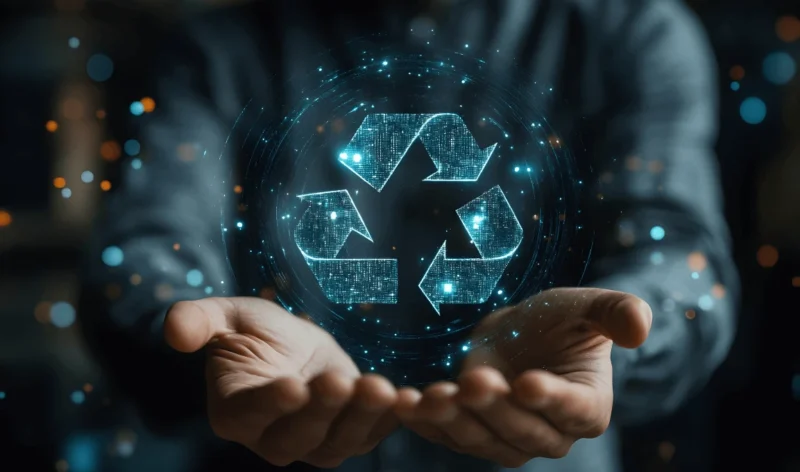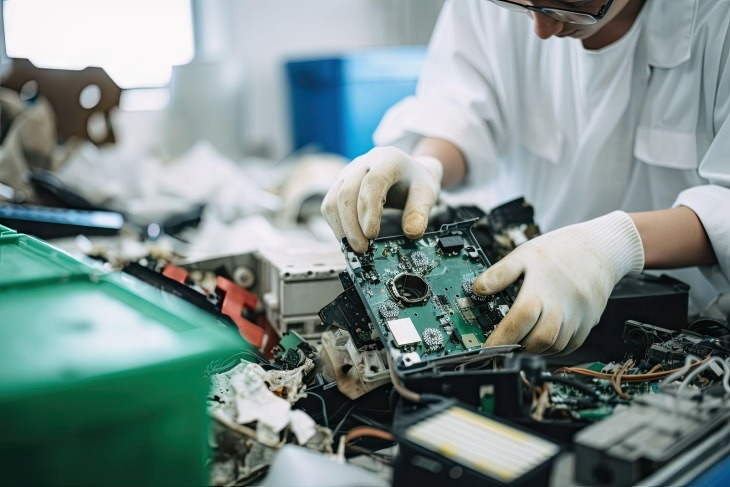Sustainable IT: Understanding IT Asset Disposition

What happens to all those laptops, desktop computers, servers, printers, and mobile devices that your company no longer needs? Outdated and inoperable devices need to go somewhere when you’re done with them, but landfills really aren’t a good option. Most of those items contain substances like lead, mercury, flame retardants, and other chemicals that could potentially harm the environment. Of course it’s never a good idea to dump waste in a landfill, if that can be avoided.
IT Asset Disposition (ITAD) addresses this problem. ITAD offers various ways to responsibly dispose of unwanted IT assets by repurposing them, salvaging parts, or recycling components.
It’s not simply about disposing of IT assets, though. ITAD also serves a very important role in information security as well. By destroying information stored on hard drives, SSDs, and elsewhere, ITAD methodologies ensure that sensitive data doesn’t end up in the wrong hands.
Understanding IT Asset Disposition
ITAD provides a comprehensive set of methodologies for disposing of unwanted IT assets. Top ITAD companies can help you evaluate your current approach and future needs, inventory your existing IT assets, and develop a strategy that helps you maintain compliance, ensure information security, and return value to your bottom line.
There are various methods for disposing of unwanted IT assets. These include:
- Data destruction: The first step typically involves erasing or destroying storage media such as hard drives, SSDs, and other components that could contain confidential information. The most common options include physical destruction or secure erasure using special software.
- Refurbishing and reselling: Although your IT assets might no longer meet your company’s needs, there may be others who see value in using them. Refurbishing those assets gives them a new life, and returns some money back to your bottom line.
- Recycling: Many of the components in your IT devices are recyclable. Plastic enclosures and parts, for example, can easily be given a new life while preventing more trash from going to the landfill. Top ITAD companies will often salvage parts from inoperable devices for re-use as well.
- Donation: Computers and printers that no longer serve your purposes often fill a valuable need for charities or schools around the world. By donating these items to worthy causes, your company can make a positive impact, while also benefiting from a tax deduction.

The Importance of ITAD for Businesses
ITAD addresses several important needs, including data security, compliance, and corporate responsibility. It also saves money, improving your company’s profitability.
Data privacy and security have become hot topics in recent years. Large-scale data breaches have made national headlines, but many smaller organizations often have issues as well, and most go unreported. Regulators have taken notice, implementing stringent guidelines and penalties for those who fail to comply. ITAD services ensure that sensitive data remains secure by erasing or destroying storage media.
ITAD also helps companies achieve their sustainability goals, improving their corporate responsibility profile by limiting their environmental impact.
Responsible IT asset disposal is also financially beneficial. The right ITAD services company can help you achieve cost savings and potentially generate revenue from the resale of unwanted IT assets.
Compliance and Security in ITAD
Information security standards have evolved significantly in recent years. Many industries and government agencies have adopted standards for data privacy and security. In many instances these are mandatory, but in any case they are highly recommended.
When a company disposes of IT assets, they may be inadvertently exposing sensitive information. Many printers and copiers, for example, may retain some record of your documents. In 2017, the US government issued a fine of over $1.2 million for HIPAA violations arising from the failure to erase hard drive data from copiers. GDPR, GLBA, CCPA, and numerous other regulations dictate that businesses take proactive measures to secure sensitive and confidential data.
Top ITAD companies carry certifications such as E-Stewards, NAID, ISO 14001, and ISO 9001.
Environmental Considerations in ITAD
Businesses are paying closer attention to sustainability than ever before. One of the greatest ways to make an impact is to address the challenges of e-waste responsibly.
Naturally, it’s important that we limit the volume of waste that we send to landfills. In the case of IT assets, though, this is especially important. Printers, computers, and mobile devices often contain potentially toxic substances like lead and mercury, bromine, and phthalates. Properly disposing of e-waste prevents these from leaking into groundwater and contaminating the soil.
Many IT assets also contain silver, gold, copper, and aluminum that can be reclaimed and reused. That reduces the demand for mining, which in turn prevents further damage to the environment.
Choosing the Right ITAD Provider
Not all ITAD companies are created equal. Here are some of the key factors you should look for when selecting a service provider:
- Certifications from E-Stewards, NAID, ISO 14001, and ISO 9001 distinguish the top ITAD companies from the rest of the pack, demonstrating a clear commitment to industry standard practices.
- Security standards also distinguish the best ITAD service providers. Look for a company, for example, that transports your assets in sealed trucks, with automatic locks, tamper-evident seals, GPS tracking, and geofencing. Similar standards should apply in every stage of the IT asset disposition process
- Environmental policies are becoming increasingly important. Look for an organization with a zero-landfill approach, and sustainability certifications such as EcoVadis.
- A track record of customer service excellence says a lot about the overall thoroughness and professionalism of your ITAD service provider. Look for a company with outstanding customer reviews.
Trends and Future Directions in ITAD
In the coming years, ITAD is likely to become even more important, as regulators and consumers increase their focus on information security and sustainability. Stricter regulations and evolving standards are inevitable. Although many states do not currently mandate recycling of electronics, for example, it’s likely that such requirements will eventually become the standard.
We can expect further innovation in ITAD services as well. Advances in technology will make it possible to recover an even larger percentage of valuable materials from electronic waste. That will improve both the economic advantages and the environmental benefits of IT asset disposal.
Conclusion
As businesses continue to navigate the complexities of managing technology amid increased regulation and attention to sustainability, it will be more important than ever to understand and implement ITAD strategy. Managing the lifecycle of IT assets is critical, not just for data security and compliance, but also for enhancing corporate sustainability and financial health.Are you ready to explore sustainable IT asset disposition for your company? Contact NCS Global to discuss your needs.